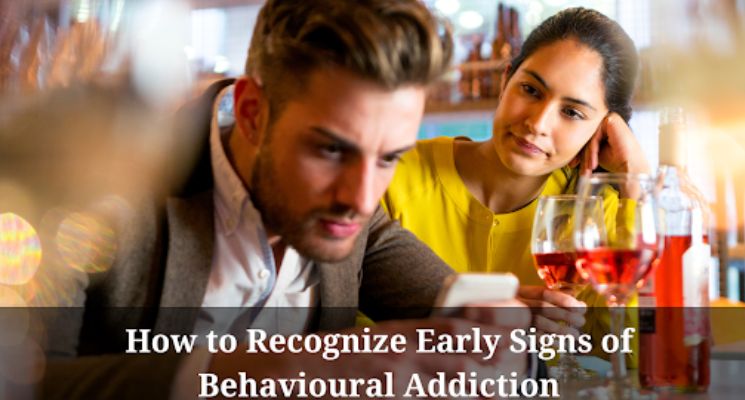Behavioral addictions pose a growing concern in today’s society, with more and more people falling victim to compulsive behaviors that can have severe consequences on their lives. Unlike substance addictions, which involve drugs or alcohol, behavioral addictions center around activities that are usually considered normal and socially acceptable, such as shopping, gaming, or exercising. However, when these activities become excessive and uncontrollable, they can lead to significant impairment in various aspects of life, including relationships, work, and mental health.
It is crucial to recognize the early signs of behavioral addiction to prevent the development of more severe problems. In this blog post, we will explore the warning signs and symptoms of behavioral addiction, as well as strategies for seeking help and support.
What is Behavioral Addiction?
Behavioral addiction, also known as process addiction, refers to a compulsive engagement in a specific activity or behavior despite negative consequences. These behaviors can activate the brain’s reward system similarly to drugs or alcohol, leading to a sense of pleasure or relief from negative emotions.
Common Types of Behavioral Addictions
Some of the most common types of behavioral addictions include:
- Gambling addiction
- Internet addiction
- Gaming addiction
- Shopping addiction
- Sex addiction
- Exercise addiction
- Food addiction
While these behaviors may seem harmless or even beneficial in moderation, they can become problematic when they consume an individual’s time, energy, and resources, leading to neglect of other important aspects of life.
Early Signs of Behavioral Addiction
Recognizing early signs of behavioral addiction is crucial for preventing the development of more severe problems. Here are some warning signs to look out for:
- Preoccupation with the Behavior
One of the earliest signs of behavioral addiction is a growing preoccupation with the activity or behavior in question. Individuals may find themselves constantly thinking about the behavior, planning their next engagement, or feeling restless or irritable when they are unable to engage in the behavior.
- Compulsive Masturbation and Sex Addiction
Compulsive masturbation is a common manifestation of sex addiction, which can lead to significant distress and impairment in various aspects of life. Individuals struggling with this issue may find themselves constantly preoccupied with sexual thoughts and urges, often engaging in excessive masturbation despite negative consequences. They may also experience feelings of shame, guilt, or self-loathing after engaging in the behavior, leading to a vicious cycle of compulsion and regret. If you’re struggling with compulsive masturbation and wondering how to stop masturbating, it’s essential to understand its symptoms and seek help from a qualified mental health professional who specializes in treating sex addiction. They can provide you with the tools and support needed to develop healthier coping strategies and address the underlying issues contributing to the addiction.
- Tolerance and Increased Engagement
As with substance addictions, individuals with behavioral addictions may develop a tolerance to the activity, requiring more and more engagement to achieve the desired level of satisfaction or relief. They may find themselves spending increasing amounts of time and resources on the behavior, often at the expense of other important activities or responsibilities.
- Unsuccessful Attempts to Cut Back or Stop
Another early warning sign of behavioral addiction is difficulty in cutting back or stopping the behavior, despite a desire to do so. Individuals may make repeated attempts to reduce their engagement or quit altogether, but find themselves unable to follow through or maintain their resolve.
- Negative Consequences
Behavioral addictions often lead to negative consequences in various aspects of life, such as:
- Relationship problems
- Work or school performance issues
- Financial difficulties
- Physical or mental health problems
Despite these negative consequences, individuals with behavioral addictions may continue to engage in the behavior, often rationalizing or minimizing the impact of their actions.
- Secrecy and Deception
Individuals with behavioral addictions may attempt to hide or downplay their engagement in the behavior, often lying to friends, family, or colleagues about the extent of their involvement. They may become defensive or angry when confronted about their behavior and may go to great lengths to conceal their activities.
- Mood Changes and Emotional Dysregulation
Behavioral addictions can have a significant impact on an individual’s mood and emotional state. They may experience intense cravings or urges to engage in the behavior, as well as feelings of guilt, shame, or self-loathing after engaging in the behavior. They may also experience mood swings, irritability, or anxiety when unable to engage in the behavior.
Seeking Help and Support
If you or someone you know exhibits signs of behavioral addiction, seeking help and support is crucial. Here are some steps you can take:
1. Acknowledge the Problem
The first step in addressing behavioral addiction is to acknowledge that there is a problem. This can be a difficult and painful process, but it is essential for beginning the journey towards recovery.
2. Seek Professional Help
Behavioral addictions can be complex and challenging to overcome on one’s own. Seeking the help of a qualified mental health professional, such as a therapist or counselor, can provide the guidance and support needed to address the underlying issues and develop healthy coping strategies. Mental health care providers like BetterHelp online therapy support make it easier to connect with licensed professionals from the comfort of your home.
3. Join a Support Group
Joining a support group for individuals struggling with behavioral addictions can provide a sense of community and understanding, as well as practical tips and strategies for managing the addiction. Groups such as Gamblers Anonymous, Overeaters Anonymous, and Sex Addicts Anonymous offer a safe and supportive environment for individuals to share their experiences and work toward recovery.
4. Develop Healthy Coping Strategies
Developing healthy coping strategies is essential for managing urges and cravings associated with behavioral addiction. This may involve finding alternative activities or hobbies, practicing relaxation techniques such as deep breathing or meditation, or engaging in regular exercise or physical activity.
5. Address Underlying Issues
Behavioral addictions often stem from underlying emotional or psychological issues, such as trauma, anxiety, or depression. Addressing these underlying issues through therapy or counseling can be an important step in the recovery process, helping individuals develop a greater sense of self-awareness and emotional regulation.
Frequently Asked Questions
How can I tell if my engaging in a particular behavior is becoming an addiction?
If you find yourself constantly preoccupied with the behavior, experiencing negative consequences, and struggling to cut back or stop despite wanting to, it may be a sign of a developing addiction.
Can behavioral addictions be as serious as substance addictions?
Yes, behavioral addictions can be just as severe as substance addictions, leading to significant impairment in various aspects of life, such as relationships, work, and mental health.
What should I do if I think I might have a behavioral addiction?
If you suspect you might have a behavioral addiction, it’s essential to seek help from a qualified mental health professional, such as a therapist or counselor, who can provide guidance and support in addressing the issue.
Are there support groups available for people struggling with behavioral addictions?
Yes, there are various support groups available, such as Gamblers Anonymous, Overeaters Anonymous, and Sex Addicts Anonymous, which provide a safe and supportive environment for individuals to share their experiences and work towards recovery.
Can addressing underlying emotional or psychological issues help in overcoming behavioral addictions?
Yes, addressing underlying issues such as trauma, anxiety, or depression through therapy or counseling can be an important step in the recovery process, helping individuals develop greater self-awareness and emotional regulation.
Conclusion
Behavioral addictions can have a significant impact on an individual’s life, leading to negative consequences in relationships, work, and mental health. By recognizing the early signs of behavioral addiction, such as preoccupation with the behavior, tolerance and increased engagement, unsuccessful attempts to cut back or stop, negative consequences, secrecy and deception, and mood changes and emotional dysregulation, individuals can take steps to seek help and support before the problem becomes more severe.
If you or someone you know is struggling with a behavioral addiction, it is important to remember that help is available. By acknowledging the problem, seeking professional help, joining a support group, developing healthy coping strategies, and addressing underlying issues, individuals can begin the journey towards recovery and a healthier, more fulfilling life.









